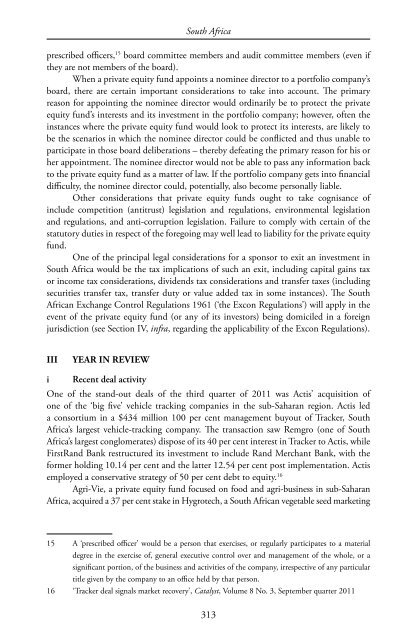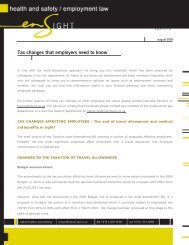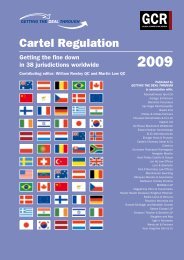The Private Equity Review - ENS
The Private Equity Review - ENS
The Private Equity Review - ENS
- No tags were found...
You also want an ePaper? Increase the reach of your titles
YUMPU automatically turns print PDFs into web optimized ePapers that Google loves.
South Africaprescribed officers, 15 board committee members and audit committee members (even ifthey are not members of the board).When a private equity fund appoints a nominee director to a portfolio company’sboard, there are certain important considerations to take into account. <strong>The</strong> primaryreason for appointing the nominee director would ordinarily be to protect the privateequity fund’s interests and its investment in the portfolio company; however, often theinstances where the private equity fund would look to protect its interests, are likely tobe the scenarios in which the nominee director could be conflicted and thus unable toparticipate in those board deliberations – thereby defeating the primary reason for his orher appointment. <strong>The</strong> nominee director would not be able to pass any information backto the private equity fund as a matter of law. If the portfolio company gets into financialdifficulty, the nominee director could, potentially, also become personally liable.Other considerations that private equity funds ought to take cognisance ofinclude competition (antitrust) legislation and regulations, environmental legislationand regulations, and anti-corruption legislation. Failure to comply with certain of thestatutory duties in respect of the foregoing may well lead to liability for the private equityfund.One of the principal legal considerations for a sponsor to exit an investment inSouth Africa would be the tax implications of such an exit, including capital gains taxor income tax considerations, dividends tax considerations and transfer taxes (includingsecurities transfer tax, transfer duty or value added tax in some instances). <strong>The</strong> SouthAfrican Exchange Control Regulations 1961 (‘the Excon Regulations’) will apply in theevent of the private equity fund (or any of its investors) being domiciled in a foreignjurisdiction (see Section IV, infra, regarding the applicability of the Excon Regulations).IIIYEAR IN REVIEWi Recent deal activityOne of the stand-out deals of the third quarter of 2011 was Actis’ acquisition ofone of the ‘big five’ vehicle tracking companies in the sub-Saharan region. Actis leda consortium in a $434 million 100 per cent management buyout of Tracker, SouthAfrica’s largest vehicle-tracking company. <strong>The</strong> transaction saw Remgro (one of SouthAfrica’s largest conglomerates) dispose of its 40 per cent interest in Tracker to Actis, whileFirstRand Bank restructured its investment to include Rand Merchant Bank, with theformer holding 10.14 per cent and the latter 12.54 per cent post implementation. Actisemployed a conservative strategy of 50 per cent debt to equity. 16Agri-Vie, a private equity fund focused on food and agri-business in sub-SaharanAfrica, acquired a 37 per cent stake in Hygrotech, a South African vegetable seed marketing15 A ‘prescribed officer’ would be a person that exercises, or regularly participates to a materialdegree in the exercise of, general executive control over and management of the whole, or asignificant portion, of the business and activities of the company, irrespective of any particulartitle given by the company to an office held by that person.16 ‘Tracker deal signals market recovery’, Catalyst, Volume 8 No. 3, September quarter 2011313





